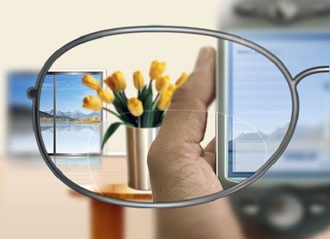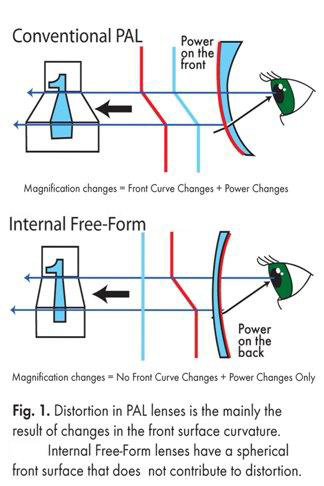Today there are many choices when it comes to what type of lens will best suit your needs. Sometimes one pair of glasses will not be able to
satisfy all your visual requirements. Our staff will work with you to analyze your vision demands and place you in the lens that's best for you.
We do all types of lenses
Extra Light Weight Lenses
Progressive Bifocals(no lines)
Thinner (Hi-Index) Lenses
Polycarbonate for extra safety
Computer lenses
RX and non-RX sunglasses
Trifocals
Lenses that change colour
UV lenses
Hard Coated Lenses
Free Form Lenses
Today there are many choices when it comes to what type of lens will best suit your needs. Sometimes one pair of glasses will not be able to satisfy
all your visual requirements. Our staff will work with you to analyze your vision demands and place you in the lens that’s best for you.
Single vision
Single vision lenses correct nearsightedness (myopia), farsightedness (hypertrophy) and astigmatism. They come in every material and you can get them coated for scratch resistance or glare (anti reflection coatings). Also they come in the transition (light to dark) lens and they can be polarized.
Single vision distance


Bifocals
Bifocals have some sort of lines either straight across or curved. While most people select the no-line or progressive lens, bifocals do have some advantages like a wide reading area.

Trifocals
Trifocals add a second line allowing for another separate area to be ground into the lens. This additional area is usually used for intermediate vision. Typically this is from about two feet to approximately five feet away. This allows for clear vision at the computer or dashboard distance.
Progressives are also known as no-line bifocals. These lenses have become the most popular choice for those who have developed presbyopia. Technology keeps advancing and the best lenses today are digitally enhanced and provide clear vision at all distances with minimum distortion. Our staff will help you select a lens that is right for the frame you choose and your visual demands.

Polycarbonate lenses
These eyeglass lenses are impact-resistant and are a good choice for people who regularly participate in sporting activities, work in a job environment in which their eyeglasses may be easily scratched or broken, and for children who may easily drop and scratch their eyeglasses. Polycarbonate lenses also provide ultraviolet protection.
High index plastic lenses
Designed for people who require strong prescriptions, these eyeglass lenses are lighter and thinner than the standard, thick "coke bottle" lenses that may otherwise be needed.

Spherical lenses
These eyeglass lenses are unlike typical lenses, which are spherical in shape. Spherical lenses are made up of differing degrees of curvature over its surface, which allows the lens to be thinner and flatter than other lenses. This also creates an eyeglass lens with a much larger usable portion than the standard lens.
Photo chromic lenses are clear indoors and darken automatically in response to sunlight outdoors. They also protect your eyes from 100 percent of the sun's harmful ultraviolet radiation.
These features make Photo chromic lenses a great convenience, because they reduce your need to wear prescription sunglasses in most outdoor conditions. Today's photo chromic lenses come in a wide variety of lens materials. So whether you prefer polycarbonate lenses, high-index lenses, or regular plastic or glass lenses, you typically will be able to purchase a photo chromic version of your preferred lenses.

This is the latest technology in optical industry. The main advantage of this lens is the comfort and wider vision. Now even a long term regular bifocal lens user can change to a progressive lens without any hazel. Internal Free-Form progressive addition lenses are made using a patented, technologically advanced design that 3-dimensionally fuses the patient’s entire prescription onto the back surface of the lens. This offers tremendous advantages over conventional front-surface progressive designs.



